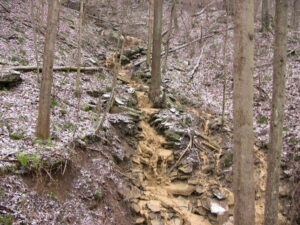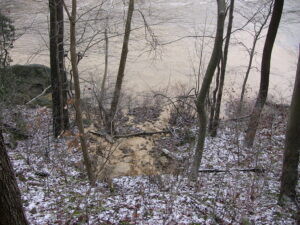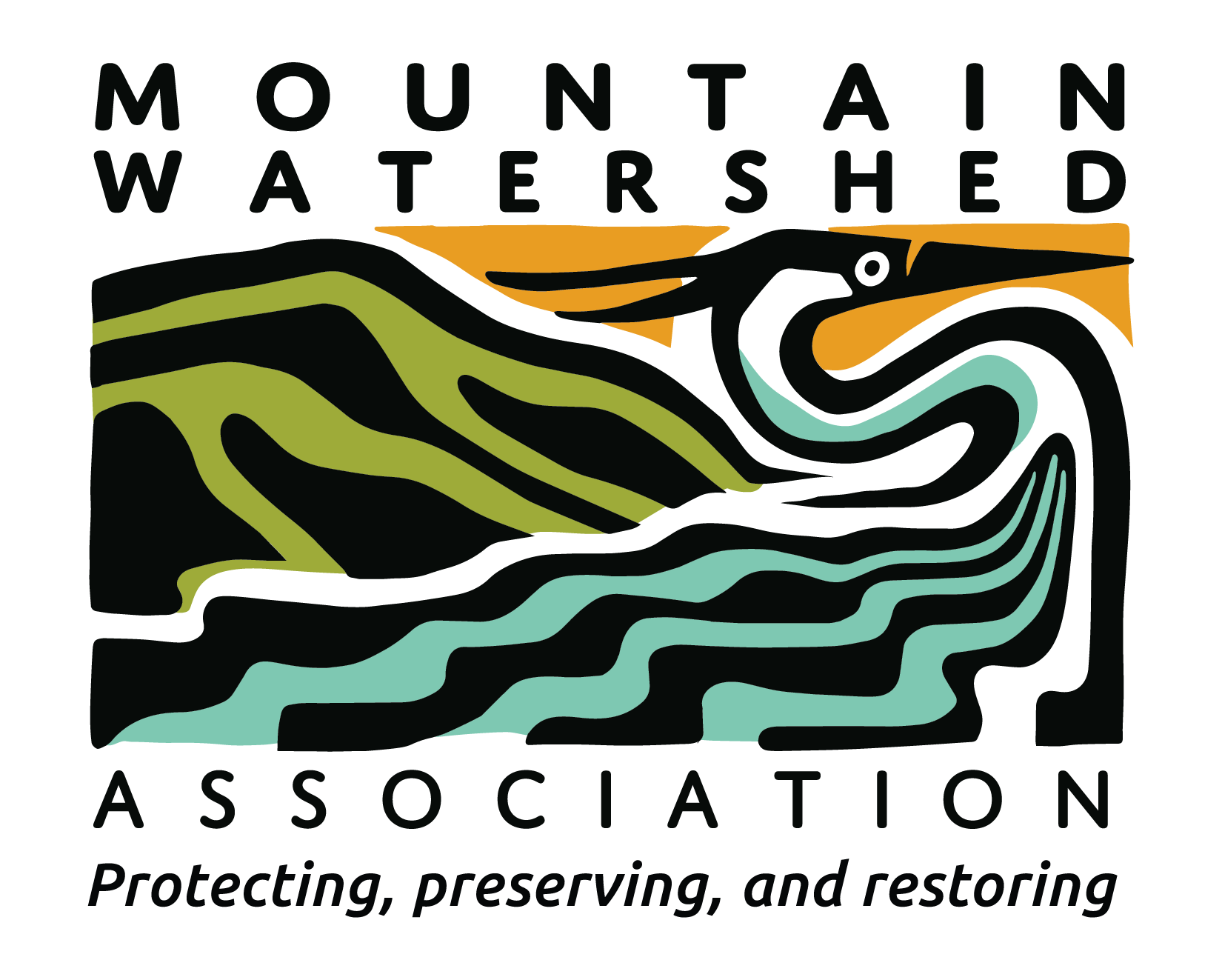On July 17, 2015, MWA filed an amicus, or friend of the court, brief with the Interior Board of Land Appeals (“IBLA”). This marks the next step in our continued fight against Amerikohl’s mining operations at the Curry site. We have continued our opposition because of the significant threat this site poses for the Youghiogheny River watershed and gorge. We hope this brief will result in a precedent-setting decision. To put this most recent filing in context, it is important to first consider the history of MWA’s struggle with this site and the legal landscape we are working in.
Amerikohl’s Curry surface mine is located in the heavily forested, wild, and remote Youghiogheny River gorge in southwestern Pennsylvania. It is entirely surrounded by public lands. It is located within three high-quality watersheds, the second highest level of stream designation in the Commonwealth. This area is used extensively for recreation including cycling, paddling, and fishing. Of particular note is the fact that it borders the Great Allegheny Passage.
In order to mine this sensitive area, Amerikohl needed to obtain zoning approval from Fayette County and a permit to mine from the Department of Environmental Protection (“DEP”). Amerikohl first attempted to gain zoning approval in 2009. Because of MWA’s opposition, Amerikohl’s efforts failed and despite its appeals all the way to the Commonwealth Court, its zoning was not approved. Also in 2009, Amerikohl applied for its state mining permit. Despite MWA’s best efforts, the DEP approved that permit in 2011. In 2012, Amerikohl again applied for zoning approval. This time Fayette approved its application. MWA’s appeal of that approval is currently pending.
 In 2011, at the same time MWA was contesting Amerikohl’s permitting and zoning efforts, the site was logged extensively. Following that timbering, sediment-laden water began flowing off the site. In response, MWA filed complaints with the DEP’s Bureau of Mining (“BOM”). The BOM responded that this was not a mining activity because coal removal had not begun. Thankfully, the site naturally stabilized when vegetation returned, thus stemming the flow of water from it.
In 2011, at the same time MWA was contesting Amerikohl’s permitting and zoning efforts, the site was logged extensively. Following that timbering, sediment-laden water began flowing off the site. In response, MWA filed complaints with the DEP’s Bureau of Mining (“BOM”). The BOM responded that this was not a mining activity because coal removal had not begun. Thankfully, the site naturally stabilized when vegetation returned, thus stemming the flow of water from it.
Timbering occurred again on the Curry site in 2013, this time after Amerikohl received its mining permit. As before, sediment-laden water began flowing from the site. Thanks to the diligence of our members, MWA began receiving reports of this pollution. Our investigation showed that the water was flowing under the Great Allegheny Passage and eventually ending up in a high-quality section of the Yough. The runoff was so bad that at one point a plume of sediment nearly one third of a mile long was visible in the Youghiogheny River. In response, we again filed a complaint with DEP. To our dismay, the BOM claimed the sediment flow was a timbering issue at the same time the Bureau of Waterways and Wetlands contradictorily indicated that it was a mining issue—a ridiculous example of intra-agency conflict. As a result, neither the timbering company nor Amerikohl was required to install erosion and sedimentation controls (“E&S”). The DEP’s failure to act forced MWA to elevate our complaint to the federal Office of Surface Mining (“OSM”). OSM stepped in and issued two notices of violation to Amerikohl and also a cessation order—thus requiring Amerikohl to install E&S controls at the site.
was visible in the Youghiogheny River. In response, we again filed a complaint with DEP. To our dismay, the BOM claimed the sediment flow was a timbering issue at the same time the Bureau of Waterways and Wetlands contradictorily indicated that it was a mining issue—a ridiculous example of intra-agency conflict. As a result, neither the timbering company nor Amerikohl was required to install erosion and sedimentation controls (“E&S”). The DEP’s failure to act forced MWA to elevate our complaint to the federal Office of Surface Mining (“OSM”). OSM stepped in and issued two notices of violation to Amerikohl and also a cessation order—thus requiring Amerikohl to install E&S controls at the site.
In response, Amerikohl appealed OSM’s enforcement to the US Department of the Interior’s Office of Hearings and Appeals. The issue on appeal was whether the timbering on the Curry site constituted a mining activity as defined under Pennsylvania’s Surface Mining Control and Reclamation Act. The DEP filed a brief in support of Amerikohl’s position that it is not a mining activity. This is an extremely important legal issue for our watershed because MWA has encountered issues with timbering on mine sites before, and if considered a timbering issue, the regulatory regime is much less comprehensive. Furthermore, a beneficial decision could break the DEP’s paralysis and finally bring E&S controls to sites where this issue has come up.
In September 2014, the administrative law judge ruled that Curry’s timbering did constitute mining. In his ruling, he stated that, “PADEP’s conclusion that Amerikohl was not involved in the timbering company was factually incorrect.” Shortly after the ruling, Amerikohl appealed again, this time to the IBLA. Understanding the importance of a beneficial decision from the IBLA, MWA requested permission to file an amicus brief. The IBLA granted our request and we filed our brief with the assistance of Fair Shake Environmental Legal Services on July 17, 2015. In our brief, available here, MWA focused on the policy implications of the IBLA’s decision. It was important for us to highlight the impact that the state’s inaction was having and the threats that sediment-laden water presents to the Yough. MWA also made several legal arguments that we felt were not adequately addressed and that would impact the IBLA’s decision. We are currently awaiting the IBLA’s ruling.
MWA knows how tremendously important this issue is for our members. We will continue the fight for as long as it takes to protect the Yough from the threat posed by the Curry Mine. Please check back for updates.
For more information and earlier posts about this issue please click here.
This post was a collaborative effort between our Community Advocate Nick Kennedy and Youghiogheny Riverkeeper Krissy Kasserman.

